小学英语一般现在时讲解和练习题
完整版)小学一般现在时讲解及练习题
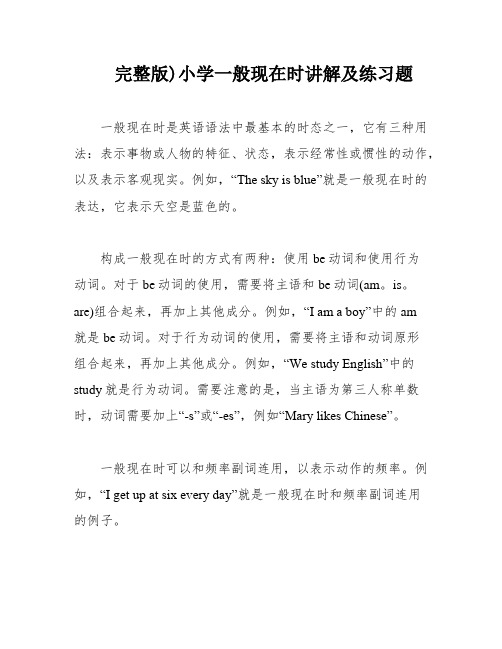
完整版)小学一般现在时讲解及练习题一般现在时是英语语法中最基本的时态之一,它有三种用法:表示事物或人物的特征、状态,表示经常性或惯性的动作,以及表示客观现实。
例如,“The sky is blue”就是一般现在时的表达,它表示天空是蓝色的。
构成一般现在时的方式有两种:使用be动词和使用行为动词。
对于be动词的使用,需要将主语和be动词(am。
is。
are)组合起来,再加上其他成分。
例如,“I am a boy”中的am就是be动词。
对于行为动词的使用,需要将主语和动词原形组合起来,再加上其他成分。
例如,“We study English”中的study就是行为动词。
需要注意的是,当主语为第三人称单数时,动词需要加上“-s”或“-es”,例如“Mary likes Chinese”。
一般现在时可以和频率副词连用,以表示动作的频率。
例如,“I get up at six every day”就是一般现在时和频率副词连用的例子。
一般现在时还可以用于构成否定句、一般疑问句和特殊疑问句。
对于be动词的否定句,需要在be动词后面加上not。
例如,“He is not a worker”就是be动词的否定句。
对于行为动词的否定句,需要在主语和动词原形之间加上don't或doesn't。
例如,“I don't like bread”和“He doesn't often play”就是行为动词的否定句。
对于一般疑问句,需要将be动词或do/does放在主语前面。
例如,“Are you a student?”就是一般疑问句。
对于特殊疑问句,需要在疑问词后面加上一般疑问句。
例如,“Where is my bike?”就是特殊疑问句。
需要注意的是,当主语为第三人称单数时,否定句和一般疑问句需要用doesn't,而不是don't或do。
例如,“He doesn't often play”和“Does she go to work by bike?”就是主语为第三人称单数时的否定句和一般疑问句。
小学英语一般现在时讲解附练习

小学英语一般现在时讲解及专项练习(附答案)时态是英语中一个重要的语法范畴,小学英语主要是如下的四大时态:一般现在时、现在进行时、一般过去时、一般将来时。
今天主要是小学英语时态重点讲解——一般现在时,附专项练习和答案!一般现在时主要描述经常会发生的动作、状态或不变的真理。
句末常出现every day/week/year/Monday , in the morning;句中常有always, usually, often, sometimesI am a student.He is tall.否定句:在be 后加notI am not a student.He is not tall.疑问句:be 动词提前到第一位。
Are you a student?Yes,I am./No,I am not.Is he tall?Yes,he is./No,he isn’t.We go to school on Monday.He goes to the park on Sunday.否定句:主语+don’t/doesn’t’t+动词原形+地点+时间We don’t go to school on Monday.He doesn’t go to the park on Sunday.疑问句:在句首加do或doesDo you go to school on Monday?Yes, we do./ No, we don’t.Does he go to the park on Sunday?Yes, he does./ No, he doesn’t.专项练习一、写出下列动词的第三人称单数形式。
eat read do take washwatch have carry study flycatch go have cook looksing teach like get come play二、用单词的正确形式填空:1.Mike ___________ (do) his homework every day.2.There ____________ (be) some water in the glass.3.We like ____________ (play) basketball after class.4.I like singing. I often ____________ (listen) to the music in the evening.5.My grandma ___________ (watch) TV every day.三、选择最佳的答案:1.____Alice often play the piano. No, she _____.A. Do; doB. Does; doesC. Does; doesn't2.___ your penfriend __ in Beijing?A. Do; liveB. Do; livesC. Does; live3.Tom and Mike __ very excited, they will take a trip.A.IsB. areC. am4.I like ________ very much.What about you?A. danceB. dancedC. dancing5.I can’t find my pen. Let me __.A. go and ask herB. go and ask hersC. go and ask she6.Fangfang is a good student. She ____maths.A. does good atB. well do itC. is good at7.The kite ____ a bird.A. look likeB. is lookingC. looks like8.Bill and I ___ good friends.A. isB. areC. am9.Sandy often ___ his homework on Sundays .A. doB. doesC. did10.What do you usually do on the weekend? I __________.A.went swimmingB. go swimmingC. visited grandparents10.What do you usually do on your holiday?A. saw elephantsB. sing and danceC.took picture11.I ____ a student. I go to school ____bus every day.A. is; byB. am; onC. am; by12.I ____ a brother. She ____ a sister.A. have; hasB. has; hasC. have; have13.You ____ a student. He ____ a teacher.A. is; isB. are; isC. are; are15. He always _____ football games.A. watchesB. watchC. doesn't16.My best friend _____ shells.A. collectsB. collectC. often17.She doesn’t _____ listening to the music.A. oftenB. likeC. likes18.My mother and I ___ always watch romantic films.A. doesn’tB. don’tC. do19.---When _____ he get home on Friday?----He gets home at four on Friday.A. doB. doesC. did专项练习题答案一、写出下列动词的第三人称单数形式。
(完整版)一般现在时练习题及答案解析

一、一般现在时填空题1.Miss Green _________ (teach) us English every day.【答案】teaches【解析】【详解】句意:格林小姐每天教我们英语。
teach教,动词;由句中的every day可知句子时态用一般现在时,主语Miss Green是第三人称单数形式,所以谓语动词teach也要用第三人称单数形式teaches。
故填teaches。
2.Sam often ________ (fly) kites with his friends on windy days.【答案】flies【解析】【详解】句意:萨姆经常在刮风的日子和他的朋友放风筝。
根据“often”可知,该句为一般现在时,主语“Sam”是第三人称单数,谓语用动词的三单形式,“fly”的三单形式是“flies”。
故填flies。
3.I think the boy ________ (look) like his father.【答案】looks【解析】【详解】句意:我觉得这个男孩看起来像他的父亲。
根据语境可知,该句为一般现在时,主语“the boy”是第三人称单数,谓语用动词的第三人称单数形式,“look”的第三人称单数形式是“looks”。
故填looks。
4.Linda __________ (exercise) every morning, so she is very healthy.【答案】exercises【解析】【详解】句意:琳达每天早上锻炼,所以她很健康。
根据时间状语“every morning”可知,句子是一般现在时,主语是第三人称单数形式,故动词应用单三式exercises。
故填exercises。
5.His brother _____________ (work) at a hospital.【答案】works【解析】【详解】句意:他哥哥在一家医院工作。
根据时态是一般现在时,主语“His brother”是第三人称单数,所以用动词work“工作”的第三人称单数works,故填works。
小学六年级上册英语时态精讲练习
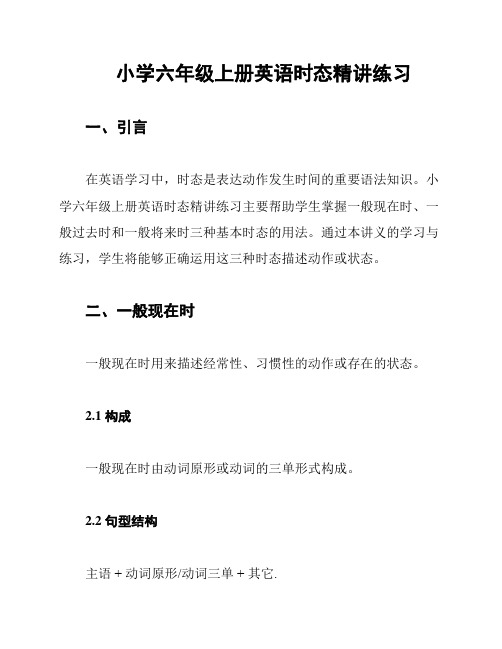
小学六年级上册英语时态精讲练习一、引言在英语学习中,时态是表达动作发生时间的重要语法知识。
小学六年级上册英语时态精讲练习主要帮助学生掌握一般现在时、一般过去时和一般将来时三种基本时态的用法。
通过本讲义的学习与练习,学生将能够正确运用这三种时态描述动作或状态。
二、一般现在时一般现在时用来描述经常性、习惯性的动作或存在的状态。
2.1 构成一般现在时由动词原形或动词的三单形式构成。
2.2 句型结构主语 + 动词原形/动词三单 + 其它.2.3 练习1. I (eat)_____ breakfast every morning.2. She (go)_____ to school by bus.3. The cat (sleep)_____ on the sofa.三、一般过去时一般过去时用来描述过去发生的动作或存在的状态。
3.1 构成一般过去时由动词的过去式构成。
3.2 句型结构主语 + 动词过去式 + 其它.3.3 练习1. I (watch)_____ a movie yesterday.2. She (visit)_____ her grandparents last week.3. They (play)_____ soccer in the park.四、一般将来时一般将来时用来描述将来要发生的动作或存在的状态。
4.1 构成一般将来时有两种构成方式:will + 动词原形和 be going to + 动词原形。
4.2 句型结构1. 主语 + will + 动词原形 + 其它.2. 主语 + be going to + 动词原形 + 其它.4.3 练习1. I (buy)_____ a new bike next month.2. She (travel)_____ to Japan with her family.3. They (move)_____ to a new house in two years.五、总结通过本讲义的学习与练习,学生应掌握一般现在时、一般过去时和一般将来时三种基本时态的构成、句型结构和用法。
英语一般现在时讲解及其练习题
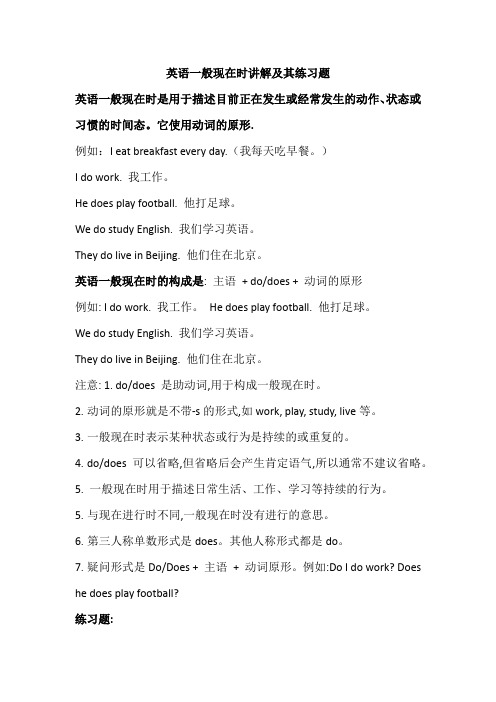
英语一般现在时讲解及其练习题英语一般现在时是用于描述目前正在发生或经常发生的动作、状态或习惯的时间态。
它使用动词的原形.例如:I eat breakfast every day.(我每天吃早餐。
)I do work. 我工作。
He does play football. 他打足球。
We do study English. 我们学习英语。
They do live in Beijing. 他们住在北京。
英语一般现在时的构成是: 主语+ do/does + 动词的原形例如: I do work. 我工作。
He does play football. 他打足球。
We do study English. 我们学习英语。
They do live in Beijing. 他们住在北京。
注意: 1. do/does 是助动词,用于构成一般现在时。
2.动词的原形就是不带-s的形式,如work, play, study, live等。
3.一般现在时表示某种状态或行为是持续的或重复的。
4.do/does 可以省略,但省略后会产生肯定语气,所以通常不建议省略。
5. 一般现在时用于描述日常生活、工作、学习等持续的行为。
5.与现在进行时不同,一般现在时没有进行的意思。
6.第三人称单数形式是does。
其他人称形式都是do。
7.疑问形式是Do/Does + 主语+ 动词原形。
例如:Do I do work? Does he does play football?练习题:一.请改正下列句子中的语法错误并将其变为一般现在时:1.She always drink tea in the morning. -She always drinks tea in the morning.2.They don't likes to eat spicy food. - They don't like to eat spicy food.3.He go to school by bus every day. - He goes to school by bus every day.4. I usually listen music while I work. -I usually listen to music while I work.5.We doesn't have any plans for tonight. - We don't have any plans for tonight.二.请改正下列句子中的语法错误并将其变为一般现在时:1. She always drink tea in the morning. -She always drinks tea in the morning.2. They don't likes to eat spicy food. - They don't like to eat spicy food.3. He go to school by bus every day. - He goes to school by bus every day.4. I usually listen music while I work. -I usually listen to music while I work.5. We doesn't have any plans for tonight. - We don't have any plans for tonight.三.用动词正确的形式填空:1. She ___________ (watch) TV every evening. Answer: watches2. They ___________ (play) basketball on Saturdays. Answer: play3. He usually ___________ (get up) at 6 o'clock in the morning. Answer:gets up4. My sister and I ___________ (like) to read books before bed. Answer: like5. The sun ___________ (rise) in the east and sets in the west. Answer: rises6. We always ___________ (have) lunch at noon. Answer: have7. Tom often _________(go )to the gym after work Answer : goes8 .My mother _________(cook )delicious meals for us Answer : cooks9.He __________ (play) basketball every weekend. Answer: plays10.The cat __________ (run) after the mouse. Answer: runs11. She usually __________ (eat) breakfast at 7 o'clock. Answer: eats12. My sister always __________ (drink) coffee in the morning. Answer: drinks13. Tom often __________ (study) English for two hours every day. Answer: studies四. 请改正下面每个句子的错误,并将其改写成一般现在时。
一般现在时知识讲解与专项练习(讲义)-人教PEP版英语六年级上册

六年级上册一般现在时知识讲解与专项练习一、一般现在时知识点【No. 1】概念:1.表不事物或人物的特征、状态。
如:The sky is blue.天空是蓝色的。
2.表示经常性或习惯性的动作。
如:I get up at six every day.我每天六点起床。
3.表示客观现实。
如:The earth goes around the sun.地球绕着太阳转。
【No.2】时间标志性词:every ... (every day/week/Sunday...)on+星期几(on Mondays/Tuesdays..)频度副词(always, usually often sometimes, rarely, seldom, never)【No.3】结构:①动词原形I like apples.②动词单三形式He plays football.③be动词I am a boy.有be无动(动:实义动词)①肯定句:主语+be+其他He is an English teacher.②否定句:主语+be not+其他He is not an English teacher.③一般疑问句:Be +主语+其他+...?Is he an English teacher?有动无be(动:实义动词)①肯定句:主语(非三单)+动词原形+其他I play football.主语(三单)+动词三单形式+其他He plays football.②否定句:主语(非三单)+don’t+动词原形+其他I don't play football.主语(三单)+doesn’t动词原形+其他He doesn't play football.③一般疑问句:Do+主语(非三单)+动词原形+其他?Do you play football?Does+主语(三单)+动词原形+其他?①肯定形式:主语十情态动词can/may+动词原形+宾语。
一般现在时(语法+习题)
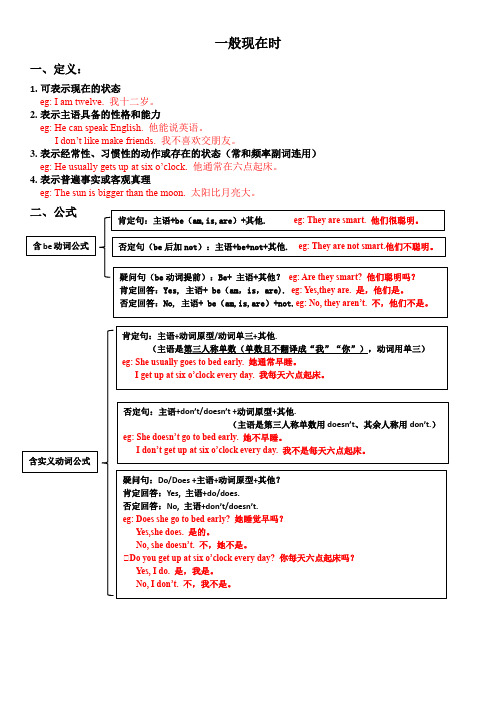
一般现在时一、定义:1.可表示现在的状态eg: I am twelve. 我十二岁。
2.表示主语具备的性格和能力eg: He can speak English. 他能说英语。
I don’t like make friends. 我不喜欢交朋友。
3.表示经常性、习惯性的动作或存在的状态(常和频率副词连用)eg: He usually gets up at six o’clock. 他通常在六点起床。
4.表示普遍事实或客观真理eg: The sun is bigger than the moon. 太阳比月亮大。
二、公式三、动词变第三人称单数的规则1.直接加s(读音:清辅音后读[s],元音和浊辅音后读[z])eg: help-helps come-comes2.以s,x,sh,ch,o结尾,加es(读音:es读[ɪz],goes和does除外)eg: watch-watches wash-washes do-does miss-misses3.以辅音加y结尾,把y变i加es(读音:es读[z])eg: try-tries study-studies4.特殊:have-has四、练习巩固:写出下列动词的单三形式go__________ catch_________ brush(刷)_____ teach_______do________ like________ have___________ watch________ drink ___________ fly___________ say_______ learn ___________ eat___________ read___________ sing___________ buy__________ study_______ stay __________ make __________ look ______ pass__________ carry ____ come__________ plant(种植)______用单词正确形式填空。
小学英语一般现在时专项练习
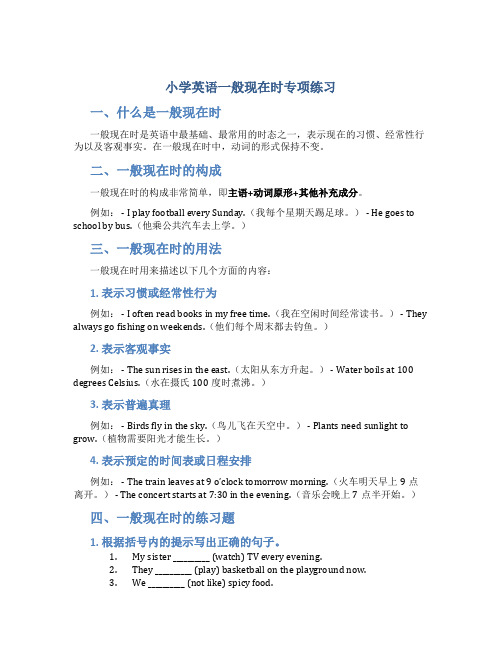
小学英语一般现在时专项练习一、什么是一般现在时一般现在时是英语中最基础、最常用的时态之一,表示现在的习惯、经常性行为以及客观事实。
在一般现在时中,动词的形式保持不变。
二、一般现在时的构成一般现在时的构成非常简单,即主语+动词原形+其他补充成分。
例如: - I play football every Sunday.(我每个星期天踢足球。
) - He goes to school by bus.(他乘公共汽车去上学。
)三、一般现在时的用法一般现在时用来描述以下几个方面的内容:1. 表示习惯或经常性行为例如: - I often read books in my free time.(我在空闲时间经常读书。
) - They always go fishing on weekends.(他们每个周末都去钓鱼。
)2. 表示客观事实例如: - The sun rises in the east.(太阳从东方升起。
) - Water boils at 100 degrees Celsius.(水在摄氏100度时煮沸。
)3. 表示普遍真理例如: - Birds fly in the sky.(鸟儿飞在天空中。
) - Plants need sunlight to grow.(植物需要阳光才能生长。
)4. 表示预定的时间表或日程安排例如: - The train leaves at 9 o’clock tomorrow morning.(火车明天早上9点离开。
) - The concert starts at 7:30 in the evening.(音乐会晚上7点半开始。
)四、一般现在时的练习题1. 根据括号内的提示写出正确的句子。
1.My sister __________ (watch) TV every evening.2.They __________ (play) basketball on the playground now.3.We __________ (not like) spicy food.4.The dog __________ (bark) loudly at strangers.5.She __________ (do) her homework after school every day. 2. 选择适当的词填空,完成下列句子。
小学英语语法一般现在时(包括练习)
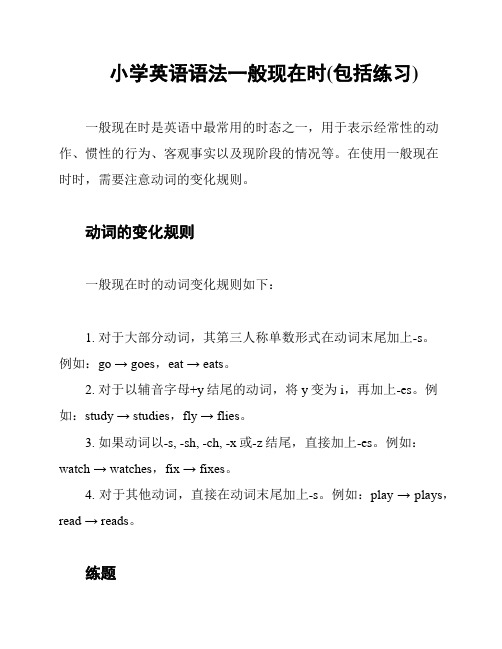
小学英语语法一般现在时(包括练习)一般现在时是英语中最常用的时态之一,用于表示经常性的动作、惯性的行为、客观事实以及现阶段的情况等。
在使用一般现在时时,需要注意动词的变化规则。
动词的变化规则一般现在时的动词变化规则如下:1. 对于大部分动词,其第三人称单数形式在动词末尾加上-s。
例如:go → goes,eat → eats。
2. 对于以辅音字母+y结尾的动词,将y变为i,再加上-es。
例如:study → studies,fly → flies。
3. 如果动词以-s, -sh, -ch, -x或-z结尾,直接加上-es。
例如:watch → watches,fix → fixes。
4. 对于其他动词,直接在动词末尾加上-s。
例如:play → plays,read → reads。
练题请根据句子的语境,用适当的动词形式填空。
每个空格只填一个单词。
1. Peter ___________ (like) to play basketball with his friends every weekend.2. My mother ___________ (work) as a nurse in the hospital.3. The cat ___________ (sleep) on the sofa most of the day.4. We ___________ (watch) movies at the cinema every Friday night.5. Sarah ___________ (brush) her teeth twice a day.参考答案1. Peter likes to play basketball with his friends every weekend.2. My mother works as a nurse in the hospital.3. The cat sleeps on the sofa most of the day.4. We watch movies at the cinema every Friday night.5. Sarah brushes her teeth twice a day.以上是关于小学英语语法一般现在时以及练习题的内容。
小学英一般现在时讲解和练习

小学英语一般现在时一. 意义:表示经常发生的事情,动作或存在的状态二. 构成及变化1.be动词的变化。
肯定句:主语+be(am,is,are)+其它。
如:I am a boy.我是一个男孩。
否定句:主语+ be + not +其它。
如:He is not a worker.他不是工人。
一般疑问句:Be +主语+其它。
如:-Are you a student? -Yes. I am. / No, I'm not.特殊疑问句:疑问词+一般疑问句。
如:Where is my bike?2. 行为动词的变化。
l、当主语为第一,二人称及复数时,助动词为do肯定句:主语+动词原形(+其它)。
如:We often play basketball after school.否定句:主语+ don't+动词原形(+其它)。
如:we don’t play basketball after school.一般疑问句:Do +主语+动词原形+其它?如: Do you often play basketball after school l? Yes, we do. / No, we don't.特殊疑问句:疑问词+以do开头的一般疑问句?如: What do you often do after school ?2、当主语为第三人称单数时 ,助动词为does肯定句:主语+动词三单式(+其它)。
如: He swims well.否定句:主语+ doesn’t+动词原形(+其它)。
如:He doesn’t swim well..一般疑问句:Does +主语+动词原形+其它。
如:Does he swim well ?Yes, he does. / No, he doesn't.特殊疑问句:疑问词+以does开头的一般疑问句?如: How does your father go to work?三.第三人称单数的动词变化规则(只有在第三人称为主语的肯定句中,动词才用三单式)(1)多数动词直接加s: runs gets likes collets takes plays climbs…….(2)结尾是s, x, sh, ch, o,前为辅音字母,结尾加es : watches teaches goes does washes crosses mixes brushes(3)动词末尾y前为辅音:将y改为i加es: study→studies fly→fliescarry→carriescry→cries但在y前如果为元音则直接加s: buys says四.时间标志:always , usually , often , sometimes ,every…一般现在时练习题(1)I.用下列单词的适当形式填空1.We often___________(play) in the playground.2.He _________(get) up at s ix o’clock.3.__________you _________(brush) your teeth every morning?4.What________________(do) he usually________________(do) after school?5.Danny ________________(study) English, Chinese, maths, science and Art at school.6.Mike sometimes __________(go) to the park with his sister.7.At eight at night, she __________(watch) TV with his parents.8.________ Mike________(read) English every day?9.How many lessons_________your classmates________(have) on Monday?10.What time_________his mother_________(do) the housework?II.改句子1.Do you often play football after school? (改为肯定句)2.I have many books.(改为否定句)3.Gao Shan’s sister likes playing table tennis (改为否定句)4.She lives in a small town near New York.(改为一般疑问句)5.I watch TV every day.(改为一般疑问句)6.We have four lessons.(改为否定句)7.Nancy doesn’t run fast (改为肯定句)8.My dog runs fast.否定句:一般疑问句:9.Mike has two letters for him.一般疑问句:否定句:10.I usually play football on Friday afternoon.否定句:一般疑问句:划线提问11.Su Yang usually washes some clothes on Saturday.否定句:一般疑问句:划线提问:12.Mingming usually waters the flowers every day.否定句:一般疑问句:13.Tom does his homework at home.否定句:一般疑问句:一般现在时练习题(2)一、用所给动词的真确形式填空1.I like ____________ (swim).2.He _________(read) English every day.3.We _________(go)to school at seven in the morning.4.Mike________(go)to school at seven in the morning.5.My mother________(like) ______(go) shopping.6.I can ________(draw) many beautiful pictures.7.She_________(make) a model plane.8.Do you ________(like)_________(run)?9.Does he_________(like)_________(jump) ?10.Does Nancy_________(grow)flowers on Saturday ?11.The teachers________(like)___________(dance).12.The teacher________(like)____________(dance).13.The students___________(speak) English in class.14.The student_________(speak) Chinese after class.15. Let’s____________and play football . ( go )16. He_____________ like swimming . ( not )17. I’m sorry ____________that . ( hear )18. Wang Bing is____________ ( write ) an E-mail to his friend .19. He has_____________a headache . ( get )20. _________you study English at school ? Yes , I___________. ( do )21. __________your sister study English at school ? No , she__________ . ( do )22. I’m _________ better . ( feel )23. Why__________Tom absent today ? ( be )二、用所给的人称改写句子1.I take photos on Sunday. ( Mike)2.We grow beautiful flowers. (she)3.They like collecting stamps. (Ben)4.I listen to music carefully. (my aunt)5.You like making a model ship. (Helen)6.We clean the classroom every day. (he)7.They look after the pandas. (Mr Wang)8.I draw a tree and some flowers. (Nancy)9.We go to bed at eight. ( my sister)10.I read newspapers in the evening. (Mr Green)一般现在时练习一、写出下列动词的第三人称单数talk______forget______hope______stop______perform______play______say______buy______worry______fly______study_______like_______make______take______love_______recite_______become_______come_______drive_______shine_______leave_____wake_______ride_______write_______hike______give______see______swim______stop______shop_______plan______get_______s it_______let_______cut_______run_______forget_______begin_______wash_____watch_______finish______teach_____fish_______reach_______go_______do_____二、用括号内动词的适当形式填空。
英语一般现在时全面讲解(附练习及答案)
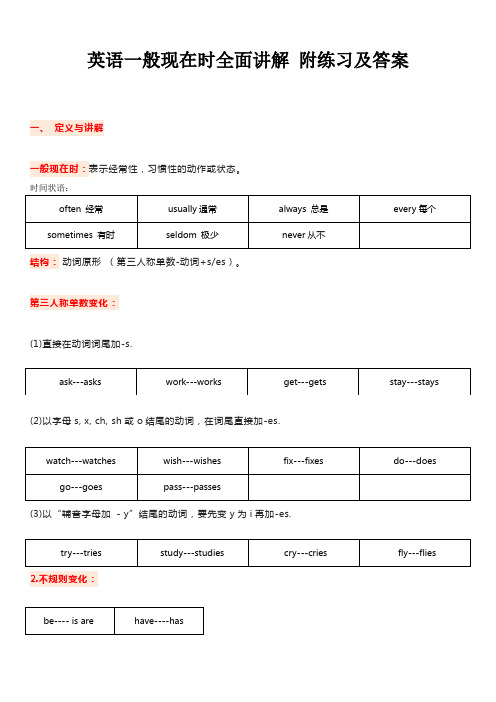
英语一般现在时全面讲解附练习及答案一、定义与讲解一般现在时:表示经常性,习惯性的动作或状态。
结构:动词原形(第三人称单数-动词+s/es)。
第三人称单数变化:(1)直接在动词词尾加-s.(2)以字母s, x, ch, sh或o结尾的动词,在词尾直接加-es.(3)以“辅音字母加- y”结尾的动词,要先变y为i再加-es.2.不规则变化:二、一般现在时用法1. 表示经常性,习惯性,永久性的动作或存在的状态.通常与副词sometimes, often, usually, always, every day (year, month ), once (twice, three times) a day,等时间状语连用。
2. 表示客观真理,科学原理,自然现象,等客观事实或格言,谚语等。
三、一般现在时的句子转换:(1)当句子中有be动词或情态动词时,则把be动词或情态动词(can,could等等)提到主语的前面变成疑问句;在be动词或情态动词后面加not变成否定句.(2)当句子中即没有be动词,也没有情态动词时,则在主语前加助动词do (you,以及复数), does(单数she,he,it)变成问句;在主语后谓语动词前加助动词don’t(I,you,以及复数), doesn’t(单数she,he,it)变成否定句,助动词后的动词要变成动词原形。
名师解析1.________ you often ________ tea?A.Do;drinks B.Does;drink C.Do;drink分析:你经常喝茶吗?根据often可知句子为一般现在时,主语为you,用助动词Do提问,动词用原形,C 符合题意,故选C。
2.My legs .A.hurt B.hurts C.hurting分析:我的腿……。
A痛,动词原形;B痛,动词单三形式,主语是名词复数,谓语动词用原形,排除;C痛,现在分词,用于现在进行时,构成be doing,缺少be,排除。
(完整版)小学一般现在时讲解及练习题

一般此刻时解说及练习1.一般此刻时:1. 表示事物或人物的特点、状态。
如: The sky is blue. 天空是蓝色的。
2. 表示常常性或习惯性的动作。
如: I get up at six every day. 我每日六点起床。
3. 表示客观现实。
如: The earth goes around the sun. 地球绕着太阳转。
2.组成:1. be 动词:主语 +be(am,is,are)+其余。
如:I am a boy.我是一个男孩。
2.行为动词:主语 +行为动词 (+ 其余 ) 。
如:We study English. 我们学习英语。
当主语为第三人称单数(he, she,it)时,要在动词后加"-s"或"-es"。
如:Mary likes Chinese.玛丽喜爱汉语。
注意:一般此刻时常常和频次副词连用。
3.我的变化 -- 否认句、一般疑问句、特别疑问句:1. be 动词的变化。
否认句:主语 + be + not +其余。
如: He is not a worker.他不是工人。
一般疑问句: Be +主语 +其余。
如: -Are you a student?-Yes. I am. / No, I'm not.特别疑问句:疑问词 +一般疑问句。
如: Where is my bike?2.行为动词的变化。
否认句:主语 + don't( doesn't ) +动词原形(+其余)。
如:I don't like bread.当主语为第三人称单数时,要用doesn't组成否认句。
如:He doesn't often play.一般疑问句: Do( Does ) + 主语 +动词原形 +其余。
如:-Do you often play football?-Yes, I do. / No, I don't.当主语为第三人称单数时,要用does 组成一般疑问句。
小学英语时态练习题
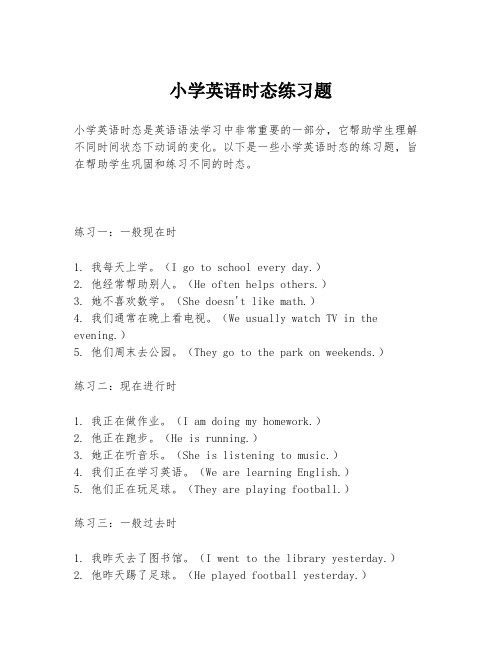
小学英语时态练习题小学英语时态是英语语法学习中非常重要的一部分,它帮助学生理解不同时间状态下动词的变化。
以下是一些小学英语时态的练习题,旨在帮助学生巩固和练习不同的时态。
练习一:一般现在时1. 我每天上学。
(I go to school every day.)2. 他经常帮助别人。
(He often helps others.)3. 她不喜欢数学。
(She doesn't like math.)4. 我们通常在晚上看电视。
(We usually watch TV in the evening.)5. 他们周末去公园。
(They go to the park on weekends.)练习二:现在进行时1. 我正在做作业。
(I am doing my homework.)2. 他正在跑步。
(He is running.)3. 她正在听音乐。
(She is listening to music.)4. 我们正在学习英语。
(We are learning English.)5. 他们正在玩足球。
(They are playing football.)练习三:一般过去时1. 我昨天去了图书馆。
(I went to the library yesterday.)2. 他昨天踢了足球。
(He played football yesterday.)3. 她昨天看了电影。
(She watched a movie yesterday.)4. 我们昨天去了动物园。
(We went to the zoo yesterday.)5. 他们昨天看了一场音乐会。
(They watched a concert yesterday.)练习四:一般将来时1. 我明天会去购物。
(I will go shopping tomorrow.)2. 他明天要参加一个生日派对。
(He is going to attend abirthday party tomorrow.)3. 她明天会去图书馆。
(完整版)一般现在时练习题及答案解析
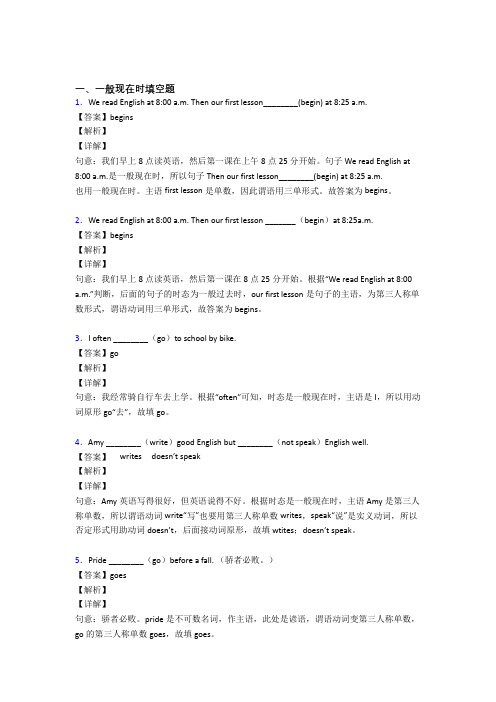
一、一般现在时填空题1.We read English at 8:00 a.m. Then our first lesson________(begin) at 8:25 a.m.【答案】begins【解析】【详解】句意:我们早上8点读英语,然后第一课在上午8点25分开始。
句子We read English at 8:00 a.m.是一般现在时,所以句子Then our first lesson________(begin) at 8:25 a.m.也用一般现在时。
主语first lesson是单数,因此谓语用三单形式。
故答案为begins。
2.We read English at 8:00 a.m. Then our first lesson _______(begin)at 8:25a.m.【答案】begins【解析】【详解】句意:我们早上8点读英语,然后第一课在8点25分开始。
根据“We read English at 8:00 a.m.”判断,后面的句子的时态为一般过去时,our first lesson是句子的主语,为第三人称单数形式,谓语动词用三单形式,故答案为begins。
3.I often ________(go)to school by bike.【答案】go【解析】【详解】句意:我经常骑自行车去上学。
根据“often”可知,时态是一般现在时,主语是I,所以用动词原形go“去”,故填go。
4.Amy ________(write)good English but ________(not speak)English well.【答案】 writes doesn’t speak【解析】【详解】句意:Amy英语写得很好,但英语说得不好。
根据时态是一般现在时,主语Amy是第三人称单数,所以谓语动词write“写”也要用第三人称单数writes,speak“说”是实义动词,所以否定形式用助动词doesn’t,后面接动词原形,故填wtites;doesn’t speak。
小学英语一般现在时知识点全面讲解附练习及答案
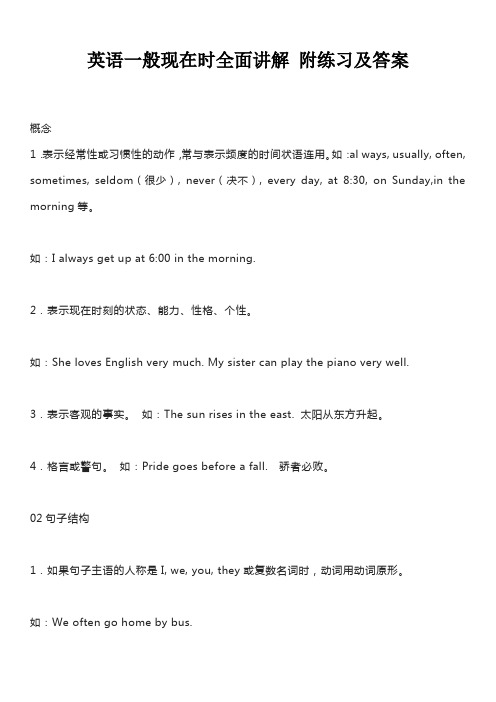
英语一般现在时全面讲解附练习及答案概念1.表示经常性或习惯性的动作,常与表示频度的时间状语连用。
如:al ways, usually, often, sometimes, seldom(很少), never(决不), every day, at 8:30, on Sunday,in the morning等。
如:I always get up at 6:00 in the morning.2.表示现在时刻的状态、能力、性格、个性。
如:She loves English very much. My sister can play the piano very well.3.表示客观的事实。
如:The sun rises in the east. 太阳从东方升起。
4.格言或警句。
如:Pride goes before a fall. 骄者必败。
02句子结构1.如果句子主语的人称是I, we, you, they或复数名词时,动词用动词原形。
如:We often go home by bus.2.如果句子的主语是第三人称单数,即:he, she, it 或单数名词时,动词要用第三人称的单数形式。
如:He often goes home by bus03动词的第三人称单数构成规则1.一般情况下在动词的后面直接加“s”;如:work→works play→plays¬ rain→rains see→sees visit→visits2.以o, x,s,sh, ch结尾的动词,在后面加“es”;如:do→does fix→fixes guess→guesses wash→washes teach→teaches3.以辅音字母加y结尾的动词,先把“y”改为“i”, 再加“es”;如:fly→flies study→studies carry→carries4.不规则变化。
如:have→has04注意在一般现在时的句子中,如果前面使用了助动词does, doesn’t, will, won’t, can, can’t, would, wouldn’t, must, mustn’t 等,尽管主语是第三人称单数,后面的动词用动词原形。
(完整版)小学英语语法一般现在时及练习题(最新整理)
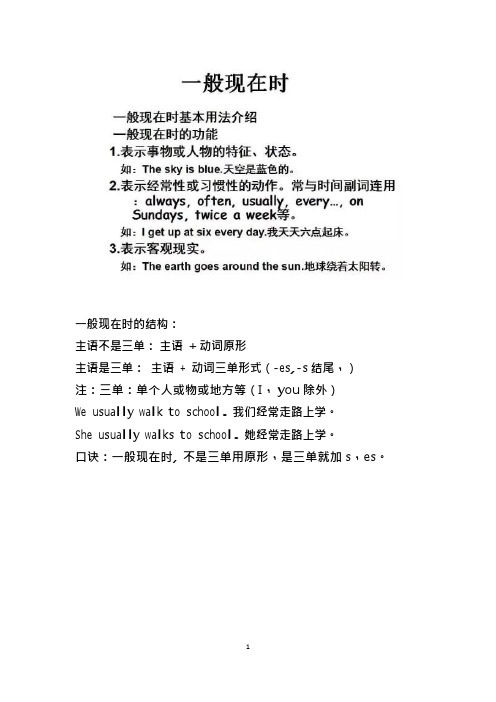
一般现在时的结构:主语不是三单:主语+ 动词原形主语是三单:主语+动词三单形式(-e s,-s结尾,)注:三单:单个人或物或地方等(I, you 除外)W e u s u a ll y w a l k t o s c h oo l.我们经常走路上学。
S h e u s u a ll y w a l k s t o s c h oo l.她经常走路上学。
口诀:一般现在时, 不是三单用原形,是三单就加 s,es。
动词三单形式变化规则1) 一般情况:加-swork—works2) 以s, x, z, sh, ch 或o 结尾: 加-espass—passes, push—pushes,catch—catches, go--goes3) 以辅音字母+y 结尾:改y 为i,加-es(辅音字母是:a,e, i, o, u 以外的字母)fly—flies4) 不规则变化have--has口诀:一般现在时,三单s/es,其他无变化,具体规则要牢记:1)直接加s 2)以s,x,ch,sh,o 结尾+es 3)辅+y,变y 为i,+es 4)特殊情况特殊记,have 变has。
练习题:用所给词的正确形式填空1.W e o f t e n(p l a y)o n t h e p l a y g r o un d.2.H e(g e t)u p a t s i x o’c l o c k.3.y o u(b r u s h)y o u r t ee t h e v e r y m o r n i n g.4.W h a t(do)h e u s u a ll y(do)a f t e r s c h oo l?5.D a nn y(s t u d y)E n g li s h,C h i n e s e,M a t h s,S c i e n c e a n dA r t a t s c h oo l.6.M i k e s o m e t i m e s(go)t o t h e p a r k w i t h h i s s i s t e r.7.A t e i g h t a t n i g h t,s h e(w a t c h)T V w i t h h i s p a r e n t s.8.M i k e(r e a d)E n g li s h e v e r y d a y?9.H o w m a n y l e ss o n s y o u r c l a ss m a t e(h a v e)o n M o n d a y?10.W h a t t i m e h i s m o t h e r(do)t h e h o u s e w o r k?11.H e o f t e n(h a v e)d i nn e r a t h o m e.D a n i e l a n d T o mm y(b e)i n C l a ss O n e.13.W e(n o t w a t c h)T V o n M o n d a y.14.N i c k(n o t go)t o t h e z oo o n S un d a y.15.T h e y(li k e)t h e W o r l d C u p?W h a t t h e y o f t e n(do)o n S a t u r d a y s17.Y o u r p a r e n t s(r e a d)n e w s p a p e r s e v e r y d a y?18.T h e g i r l(t e a c h)u s E n g li s h o n S un d a y s.19.S h e a n d I(t ak e)a w a l k t og e t h e r e v e r y e v e n i n g.20.T h e r e(b e)s o m e w a t e r i n t h e bo tt l e.M i k e(li k e)c oo k i n g.22.T h e y(h a v e)t h e s a m e h obb y.M y a un t(l oo k)a f t e r h e r b a b y c a r e f u ll y.24.Y o u a l w a y s(do)y o u r h o m e w o r k w e ll.I(b e)ill.I’m s t a y i n g i n b e d.26.S h e(go)t o s c h oo l f r o m M o n d a y t o F r i d a y.27.L i u T a o(do)n o t li k e P E.28.T h e c h il d o f t e n(w a t c h)T V i n t h e e v e n i n g.29.S u H a i a n d S u Y a n g(h a v e)e i g h t l e ss o n s t h i s t e r m.30.-W h a t d a y(b e)i t t od a y?-I t’s S a t u r d a y.31.D o n’t m ak e a n o i s e.G r a n dp a(s l ee p).32.T o m’s f a m il y(w a t c h)T V.33.I t(t ak e)m e t w o h o u r s t o f i n i s h m y h o m e w o r k l a s t n i g h t.34.W h a t y o u r m o t h e r(do)e v e r y e v e n i n g?S h e(w a s h)c l o t h e s.35.i t(r a i n)e v e r y d a y?36.W h a t(do)y o u o n S un d a y s?W e(p l a y)f oo t b a ll.37.T h e r e(b e)a f oo t b a ll m a t c h o n T V e v e r y m o r n i n g.38.T h e y o f t e n(v i s i t)t h e G r e a t W a ll.39.W h o(d a n c e)t h e b e s t i n y o u r c l a ss?40.H e(n o t c o m e).41.T h e e a r t h(m o v e)r o un d t h e s un.42S h e(b u y)a s w e a t e r.43.M r.W a n g o f t e n(go)t o S h a n g h a i.二、改句子1.D o y o u o f t e n p l a y f oo t b a ll a f t e r s c h oo l?(肯定回答)2.I h a v e m a n y boo k s.(改为否定句)3.G a o S h a n’s s i s t e r li k e s p l a y i n g t a b l e t e nn i s(改为否定句)4.S h e li v e s i n a s m a ll t o w n n e a r N e w Y o r k.(改为一般疑问句)5.I w a t c h T V e v e r y d a y.(改为一般疑问句)6.D a v i d h a s a go a l.(改为一般疑问句)7.W e h a v e f o u r l e ss o n s.(否定句)8.Nancy doesn’t run fast(肯定句)9.M y dog r un s f a s t.(一般疑问句)(把 10—14 小题变否定句,一般疑问句和划线提问)10.M i k e h a s t w o l e tt e r s f o r h i m.11.I u s u a ll y p l a y f oo t b a ll o n F r i d a y a f t e r n oo n12.S u Y a n g u s u a ll y w a s h e s s o m e c l o t h e s o n S a t u r d a y.13.M i n g m i n g u s u a ll y w a t e r s t h e f l o w e r s e v e r y d a y14.T o m do e s h i s h o m e w o r k a t h o m e.三、写出下列动词的第三人称单数形式:1.wash m a t c h g u e ss studyf i n i s h go s n o w c a rr y2.stop see d r i v e l e tc a rr y k ee p j o i n f i nd t h i n kteach catch3.stay b e g i n forget forgetli e d i e r un p r e f e r g i v er i n g d a n c e h op e四、单项选择:1.T h e r e a n E n g li s h f il m a t t h e c i n e m a n o w.A.w ill h a v eB.i s go i n g t o h a v eC.i s go i n g t o b eD.i s2.T h e p i c t u r e n i c e.A.l oo k sB.i s l oo k e dC.l oo kD.i s l oo k i n g3.S h e do w n a n d s oo n f a ll s a s l ee p.A.li v eB.l a i nC.l a i dD.s i t s4.T h e y t h e o ff i c e i n t i m e v e r y m o r n i n g.A.r e a c h t oB.a rr i v e dC.w e n tD.g e t t o5.W e s h a ll go t o S h a n g h a i o n b u s i n e ss b e f o r e y o u b a c k n e x t w ee k.A.w ill c o m eB.c a m eC.w o u l d c o m eD.c o m e6.T h e p l a n e o v e r t h e r e.A.i sB.a r eC.a mD.w a s7.I s ee h e r t h e r oo m t h i s m o r n i n g.A.t o e n t e rB.e n t e r e dC.e n t e rD.e n t e r s8.T h e t e a c h e r u s t o c o m e t o s c h oo l o n t i m e.A.a s kB.a s k i n gC.a s k sD.a s k e d9.J o hn a l w a y s o t h e r s.A.h e l pB.h e l p i n gC.h e l p sD.t o h e l p10.H e f o r e i g h t h o u r s e v e r y d a y.A.w o r k i n gB.t o w o r kC.w o r k sD.w o r k e d11.Y o u’d b e tt e r a t h o m e a n d y o u r h o m e w o r k.A.t o s t a y,doB.s t a y,doC.t o s t a y,t o doD.s t a y,t o do12.H e s i t s do w n a n d a r e s t.A.h a v i n gB.h a v eC.t o h a v eD.h a s13.U n c l e W a n g n e v e r a c ak e.A.m ak eB.t o m ak eC.m ak i n gD.m ak e s“”“”At the end, Xiao Bian gives you a passage. Minand once said, "people who learn to learn are very happy people.". In every wonderful life, learning is an eternal theme. As a professional clerical and teaching position, I understand the importance of continuous learning, "life is diligent, nothing can be gained", only continuous learning can achieve better self. Only by constantly learning and mastering the latest relevant knowledge, can employees from all walks of life keep up with the pace of enterprise development and innovate to meet the needs of the market. This document is also edited by my studio professionals, there may be errors in the document, if there are errors, please correct, thank you!。
2024小升初英语练习专题11 时态一(一般现在时) (学生版+解析版)

专题11 时态一(一般现在时)小贴士1.一般现在时的三单用法:当主语是第三人称单数时,谓语动词用第三人称的单数形式。
谓语动词的第三人称单数形式的变化规则如下:1)一般在动词后直接加s。
如:talk –talks, live –lives, stay-stays。
2)以s, x., ch, sh或o结尾的动词在其后加es。
如:watch –watches, wash –washes, go –goes。
3)以辅音字母加y结尾的动词,把y变成i再加es。
如:carry – carries, fly –flies。
4)特殊的,如:have的第三人称单数为has。
2.用法a.表示经常发生的动作、行为或存在的状态。
常用的时间状语有:often, usually, always, sometimes, seldom, never, every day/week/ year…等。
例如: I go to school every day except Sunday.除了星期日,我每天上学。
b.表示一种客观事实或普遍真理,或在谚语中。
例如: The earth moves/ goes around the sun.地球绕着太阳转。
时态(一般现在时)专练一、单项选择1.—How often ________ your father cook for you?—________.A.do, Two times B.does, NeverC.is, Once a week D.did, Seldom2.My brother usually ________ up late but tomorrow he ________ up early.A.gets; get B.get; will get C.gets; will get D.get; will gets 3.Now his father seldom ________ out for a walk after supper.A.go B.went C.goes D.gone 4.Trees _____ our city ______.A.make; clean B.makes; clean C.making; clean5.She ________ every morning.A.exercise B.exercising C.exercises D.exercised 6.My best friend ________ a Smartwatch, but I ________.A.doesn’t have; do B.doesn’t have; have C.don’t have; do D.don’t have; have 7.—My friend Lisa often ________ me with my lessons.—________ kind she is! May I become her friend, too?A.help; How B.helps; How C.help; What D.helps; What 8.—Do you have an ________ sister, Tony?—Yes, I do. And she often ________ a bike to the beach with me.A.older; ride B.older; rides C.elder, ride D.elder, rides 9.On Saturdays Susan ________ some running and goes shopping with Mary.A.is doing B.will do C.does D.go 10.—How does Lily go to school every day?—Lily ________ far from school. She goes to school by bus.A.lives B.is living C.live D.living11.My son is only 12 years old, but he is the tallest in our family. He ________ so fast.A.grows B.will grow C.grew D.has grown12.Every day I __________ sports with my parents to keep healthy.A.am doing B.do C.did D.will do13.—Where does your sister have lunch?—She usually _________ lunch at school.A.had B.has C.is having D.will have14.Because of COVID-19(新冠肺炎), my friend always ________ food and clothes online(线上).A.buying B.buys C.to buy D.buy15.Lined with trees and flowers, the streets ________ our city more attractive than before.A.would make B.was making C.make D.made16.My brother often ________ to the water park to have fun in summer.A.go B.goes C.will go D.went17.Now my father ______ his bike to work every day instead of driving.A.rides B.is riding C.rode D.will ride18.—Tina, what do you usually do at weekends?—I usually ________ swimming with my parents.A.go B.goes C.going D.went19.Mary _______ the piano very well, but she is too busy to play these days.A.is playing B.played C.plays20.It often ________ in summer. Don’t forget to take an umbrella with you.A.rain B.is raining C.rains D.will rain21.I always ________ volleyball with my classmates after school, but Gina always ________ TV at home.A.play; watchs B.plays; watchC.play; watches D.plays; watches22.Lisa always gets A in math. She ________ it well.A.don’t learn B.learns C.doesn’t learn D.learn23.Sam often ________ newspapers after supper. But today he is ________ a letter.A.reads; writing B.reads; writesC.is reading; writes D.is reading; writing24.Millions of tourists ________ the Great Wall every year.A.visit B.will visit C.visited D.have visited25.—Excuse me, what time ________ the concert ________?—Well, in fact you’re late. It ________ 20 minutes ago.A.did...begin; began B.does...begin; began C.did…begin; begins D.does...begin;begins26.His father ________ write by hand, but now he ________ computer to write.A.used to, used B.is used to, used toC.is used for, used to D.used to, uses27.—Where is Mr. Brown?—He ________ in the park. He ________ here every Sunday afternoon.A.walks; walks B.walks; is walking C.is walking; walks28.—Can I help you, sir?—Yes. I bought this radio here yesterday, but it _______.A.works B.worked C.doesn’t work D.isn’t work29.Mr. Black usually ________ TV at night. Now he ________ a basketball game on TV.A.watches; watching B.sees; seeingC.sees; is seeing D.watches; is watching30.Our English teacher always ________ us ________ try our best to realize the dream.A.encourage; to B.encourages; to C.encourage; with D.encourages; with31.My father likes football but he ________ plays it. He only ________ football matches on TV!A.always; watch B.never; watches C.often; watched D.usually; will watch32.—________? —She is of medium height.A.What does your cousin like?B.What did your cousin like?C.What does your cousin look like?D.What was your cousin like?33.—Look! It ________ outside.—Yes. It often ________ here in summer.A.rains; raining B.is raining; rains C.is raining; rain D.rains; raining 34.The students will go to the Palace Museum if it ________ tomorrow.A.won’t rain B.isn’t raining C.doesn’t rain D.don’t rain 35.Water _______ 70% of the human body.A.is made up B.makes up C.makes up of D.make up 36.—We’ll go for a picnic if it ________ this Sunday.—Wish you a lovely weekend.A.rain B.doesn’t rain C.won’t rain D.rains 37.Lily ________ about the question at the moment, and now she ________ it.A.is thinking, is understanding B.is thinking, understandsC.thinks, understands D.thinks, is understanding38.Her father is a teacher. He ________ in a high school.A.teach B.teachs C.teaches D.teaching 39.—What does David like?—He likes ________ basketball, so he often ________ it in the afternoon.A.to play; playing B.playing; to playC.playing; plays D.plays; to play40.—Mom, dad often ________ after dinner. But now he is sleeping.—He is very tired.A.walk B.will walk C.is walking D.walks 41.—________ Jim ________ a new phone?—Yes. He likes it very much.A.Does; has B.Do; have C.Does; have D.Does; like 42.We ________ a Chinese class today. We ________ an English class now.A.aren’t having; are having B.don’t have; haveC.aren’t having; have D.don’t have; are having43.She is very rich and she ________ three houses.A.get B.have C.has D.had44.My sister ________ very well.A.sing B.sings C.singing D.to sing45.—Hurry up. Look at the timetable. The last bus ________ at 11:30 p.m.—Don’t worry. We still have 10 minutes ________.A.leave; left B.left; leaves C.leaves; left D.will leave; leaves46.The boy ________ his homework after school every day.A.do B.doing C.is doing D.does47.I have a soccer, but my friend ________.A.don’t B.does C.doesn’t D.do48.He ________ a sister, but he ________ a brother.A.has; don’t hasB.have; don’t haveC.has; doesn’t hasD.has; doesn’t have49.Susan likes tennis, but she ________ a tennis ball.A.don’t have B.aren’t have C.doesn’t D.doesn’t have50.Michael usually ________ meat and vegetables.A.eat B.eatsC.is eating D.to eat51.She usually __________ her mother in the afternoon, but this afternoon she __________ a letter.A.helps; writes B.is helping; is writing C.is helping; writes D.helps; is writing52.—Poppy, with Eddie and Hobo, ________ a movie after dinner every evening.—How interested they are in it!A.watches B.watch C.are watching D.is watching53.— _________ he ________ a white shirt?— No. He has a black one.A.Does; has B.Do; has C.Does; have D.Do; have54.Mary ________ a gift from a friend of hers, but she doesn’t want to ________ it.A.receives; accept B.accepts; receive C.receive; accepts D.accept; receives55.My mother often ________ presents ________ my grandmother.A.buy; for B.buys; for C.is buying; for D.buys; to56.Sometimes my father _________ to work ________ night.A.go; at B.goes; at C.go; in D.goes; in57.Tom usually ________ English books in the morning. But now he ________ basketball.A.reads; plays B.is reading; plays C.reads; is playing58.Kangkang enjoys ________ football very much, but Han Mei ________.A.playing; doesn’t B.play; doesn’tC.to play; didn’t D.playing; didn’t59.—Can you give me a hand, Betty?—But Andy, you ________ my help every five minutes. I ________ TV at this moment.A.need, watch B.are needing, watchC.need, am watching D.are needing, am watching60.She ________ to work by bus.A.prefer to going B.prefer going C.prefers to go D.prefers go61.—What do you know about Mr. Lin?—He often ________ time ________ his children.A.takes; to help B.took; helped C.take; help D.takes; helping62.—What do you think of your Maths teacher?—He’s always strict _______ us and he never _______.A.with, smile B.about, smiles C.about, laugh D.with, smiles63.Jack often ________ two hours a day ________ TV.A.spends; watching B.spent; watches C.spends; watches D.spent; watching 64.Mike and David _______ their beds by themselves.A.doesn’t make B.makesC.don’t make D.can makes65.My sister usually ________ online on weekends.A.go B.goesC.will go D.is going66.Bill can’t play games if he ________ his homework.A.doesn’t B.don’t C.doesn’t finish D.don’t finish 67.My mother always ________ me a nice present on my birthday.A.gives B.gave C.give D.is giving 68.—________ does he ________ English class?—He has English every day.A.What time; hasB.When; hasC.What time; haveD.When; have69.We ________ at home if it ________ tomorrow.A.stay; rains B.will stay; rainsC.will stay; will rain D.stay; will rain70.Three years ago, I ________ in a primary school and now I ________ in a middle school.A.was; was B.am; am C.was; am D.am; was 71.My mum always ______ me to stick to my dream when I want to give up.A.encourage B.encouraged C.encourages D.will encourage 72.—What do you think of your English teacher?—She’s kind and friendly. She ________ on well with everyone in our class.A.gets B.got C.will get D.was getting 73.Sam ________ playing the guitar but his brother doesn’t.A.has loved B.will love C.loved D.loves 74.The beautiful girl ________ long hair.A.has B.have C.is D.are 75.Andy with Millie ________ to school every weekday.A.walks B.walking C.walk76.—________ your sister have a computer?—I don’t think she has _________.A.Do; it B.Does; one C.Do; one D.Does; it 77.Millie, ________ her mother, ________ singing.A.like; likes B.likes; likes C.like; like D.likes; like 78.He ________ at 6:30 a.m. on weekdays, but he never ________ at weekends.A.do morning exercise; do exercises B.does morning exercises; do exercises C.does morning exercises; does exercise D.does morning exercises; does exercises 79.Jim ________ “I can ________ Chinese now.”A.say, speak B.says, speak C.speaks, say D.speak, speak 80.Tom isn’t ________ his mother, but he ________ her very much.A.likes; like B.like; likes C.likes; likes D.like; like 81.The boy with his friends often ________ a kite on Sundays in spring.A.fly B.flying C.flies D.to fly82.I ________ a toy car ________ my friend.A.want to buy; for B.wants to buy; toC.want buy; for D.wants buy; for83.Uncle Joe ________ ________.A.looks; young B.look; young C.looking; young D.looks; younger 84.My mother is a good ________, and she always ________ delicious food for us.A.cooker; cooks B.cook; cooks C.cook; cooker D.cooker; cooker 85.His mother often ________ at 6:30 in the morning.A.wakes up him B.wake up himC.wakes him up D.wake him up86.I don’t know if (是否) it ________ tomorrow, but if (如果) it ________, I’ll stay at home.A.will rain; rains B.will rain; will rain C.rain; will rain D.rains; rains 87.Every winter many tourists ________ Hainan.A.visits B.visit C.will visit D.visited 88.The earth is a planet and it ________ around the sun.A.turns B.turned C.has turned D.will turn 89.My uncle usually ________ tea after dinner, but now he ________ coffee.A.drinks; drinks B.drinks; is drinking C.is drinking; is drinking90.—Jim ________ computer games now, right?—Yes. He ________ computer games for half an hour every day.A.is playing; plays B.plays; is playing C.is playing; is playing D.plays; plays 91.If Emily ________ back early, we’ll go to see the film together.A.came B.will come C.comes D.is coming92.Mary ________ her grandparents.A.live in B.live with C.lives with D.live at93.The old man sometimes ________ to the park ________ foot.A.go; on B.goes; on C.go; by D.goes; by94.John usually ________ TV after dinner for a short time. But now he ________ computer games.A.watch; plays B.watch; is playing C.watches; is playing D.watches; playing95.Every museum ________ a lot of history.A.has B.have C.having D.had96.It ________ me 3 hours to learn English every day.A.takes B.taking C.taken D.took97.There ________ a lot of housework every day. I feel very tired.A.is B.are C.was D.were98.Although Maths is difficult to learn, students never ______.A.give them up B.gave it upC.give it up D.give up them99.Many parents are busy working and always ________ their children ________.A.leave; alone B.left; alone C.leave; lonely D.left; lonely100.—Is your home near your school, Jack?—No, my home ________ in the east of our city, ________ my school is in the west.A.lie; but B.lies; but C.lays; so D.lay; and专题11 时态一(一般现在时)小贴士1.一般现在时的三单用法:当主语是第三人称单数时,谓语动词用第三人称的单数形式。
- 1、下载文档前请自行甄别文档内容的完整性,平台不提供额外的编辑、内容补充、找答案等附加服务。
- 2、"仅部分预览"的文档,不可在线预览部分如存在完整性等问题,可反馈申请退款(可完整预览的文档不适用该条件!)。
- 3、如文档侵犯您的权益,请联系客服反馈,我们会尽快为您处理(人工客服工作时间:9:00-18:30)。
一般现在时
1. 一般现在时的概念
一般现在时表示经常的、习惯性的动作或存在的状态。
构成:主语+动词原形+宾语
一般现在时用行为动词的原形,但第三人称单数作主语时,动词要用第三人称单数形式。
(一般的动词词尾+S。
以sh/ch/s/x结尾的词+es.以辅音字母Y结尾的把Y变成i再+es。
辅音字母+o结尾的+es.)
2. 一般现在时的构成
一般现在时的构成主要有两种形式:
(1)be型:句子的谓语动词只有be(am,is或are):
a.肯定句中,只出现be,如:I am a student.我是一名学生。
b.否定句中,要在be后面加not,如:She isn't a teacher.她不是教师。
c.一般疑问句,要将be放在句子开头(注意句首字母大写),句尾用问号,答语用Yes,主语+be.或No,主语+be+not.如:
—Are you ready?—你准备好了吗? —Yes,I am.—是的,我准备好了。
(—No,I'm not.—不,我没准备好。
)
(2)实义动词( do )型:句中的谓语动词为实义动词(也叫行为动词):
a.肯定句中,只出现实义动词,如:
I get up in the morning.我早晨起床。
b.否定句中,要在实义动词前面加do(does)+not,do(does)作助动词,本身无意义,常与not缩写成don't(doesn't),如:
I don't like vegetables.我不喜欢蔬菜。
c.一般疑问句,要在句子开头加助动词Do(does),句尾用问号,简略答语用Yes,主语+do(does).或No,主语+do(does)+not.如:
—Do you like oranges?—你喜欢桔子吗?
—Yes,I do.—是的,我喜欢。
(—No,I don't.—不,我不喜欢。
)
3.一般现在时的用法
1) 经常性或习惯性的动作,常与表示频度的时间状语连用如:every…, sometimes, at…, on Sunday等。
I leave home for school at 7 every morning. 我每天早上7点去上学。
2) 客观真理,客观存在,科学事实。
The earth moves around the sun. 地球绕着太阳。
Shanghai lies in the east of China. 上海位于中国的东部。
3) 表示格言或警句中。
Pride goes before a fall. 骄者必败。
注意:此用法如果出现在宾语从句中,即使主句是过去时,从句谓语也要用一般现在时。
例:Columbus proved that the earth is round.
4) 现在时刻的状态、能力、性格、个性。
Xiao Wang writes good English but does not speak well.
小王的英语书面表达能力比口语好。
比较:Now I put the sugar in the cup.
I am doing my homework now.
4.试一试
1. We often______(play) in the playgound.
2. He _____(get) up at six o’clock.
3. You ______(brush) your teeth every morning.
4. He usually (go)______ to swim after school
5. Danny _____(study) English,Chinese,Maths,Science and Art an school.
6. Mike sometimes ________(go) to the park with his sister.
7. At eight at night, she __________(watch) TV with his parents.
8. Mike________(read) English every day.
9. His mother_________(do) the housework.。
